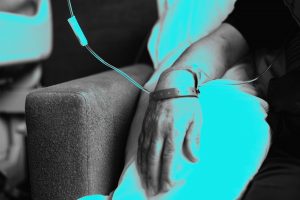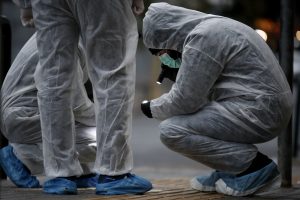One sign your office life is officially back to normal: a colleague comes to work, hacking up a lung, and gets props for pushing through illness .
If it seems like coughing and sneezing are a louder-than-usual workplace soundtrack this winter, it isn’t your imagination. Respiratory illnesses have lingered above the national baseline since November, according to the Centers for Disease Control and Prevention, as influenza, Covid-19, RSV and the common cold circulate.
Far from staying home to halt the spread of germs, American workers are reporting to their desks at the highest rates in almost four years. Last week office occupancy hit its highest level since March 2020, according to Kastle Systems, which tracks building-access card swipes.
“You really have to be unable to speak and unable to function to really make an excuse for yourself and say, ‘I’m going to take a sick day,’” says Alberta Johnson , founder and chief executive of People Experts, an HR consulting firm.
Johnson, who works a hybrid schedule, recently kept chugging through a sinus infection. She canceled some in-person meetings and events to protect others but didn’t take time off until she reached the point of exhaustion. She scolds herself in hindsight for compromising her health and modeling a suck-it-up attitude to her team.
Subtly or explicitly, bosses sometimes urge employees to ignore minor symptoms. Their own reluctance to take sick days can signal that subordinates are expected to gut it out. Asking whether an employee feels well enough to work from home, instead of immediately granting a day off, can also apply pressure. So can harping on how inconvenient it is and that co-workers will have to pick up the slack.
In a January survey of 1,000 U.S. managers by Resume Builder, one-fifth said they encourage under-the-weather employees to come to the office. Almost a quarter said they suspect workers lie about being sick or exaggerate the severity of their illnesses.
Managers frustrated by the many ways we work now are trying to gain a sense of control over their people, says Stacie Haller , Resume Builder’s chief career adviser. The survey results are consistent with others that show managers often doubt whether their charges are giving full effort while working from home.
Workers can’t win, Haller says. They feel shamed by bosses if they call in sick or shamed by colleagues if they show up contagious.
It’s going around
The good news is the latest Covid variant appears less dangerous, or at least no worse, than previous versions. The bad news is the virus’s mutations keep adding to the list of ways people can get sick.
“We unfortunately expect that every season we’ll have a new disease to battle,” says Dr. Nahid Bhadelia , director of the Boston University Center for Emerging Infectious Diseases.
Some employees take sick days whenever they sniffle or need a mental break. About 30% of white-collar workers with access to paid sick leave used it last year, up from 21% in 2019, according to HR-software company Gusto. That still means most people don’t take sick time.
Laptop-bound workers often sign on from home rather than call in sick, typing and tissue-blowing in their pajamas. Even Covid isn’t a slam-dunk reason to miss work anymore if symptoms aren’t severe.
(Speaking of slam dunks: The sneakers Michael Jordan wore during his famous “flu game”—he scored 38 points with a 103-degree fever in Game 5 of the 1997 NBA Finals— sold for $1.38 million last summer. Look no further for evidence that we still fetishize toughing it out.)
In certain cities, sick-shaming bosses risk blow back. In New York City and Washington, D.C., for example, it is illegal to ask employees for doctors’ notes after brief absences.
Even less direct hassling could be grounds for a complaint, says Vanessa Matsis-McCready , vice president of human resources at Engage PEO, which handles HR functions for small and midsize businesses. A general sense that a department’s culture is to push through sickness is enough to report to HR, she said. It may not be enough to win a grievance case, but businesses can pay a price in reputation and morale.
Learning to rest and recover
When I spoke with Megan Wollerton on Monday, one of her employees had just called in sick. Given that Wollerton’s company, Life Force Wellness, provides health coaching as a benefit to other businesses, there was only one thing to do: She told the employee to take the day off and reassigned client calls.
Wollerton, 37, was an office manager at an energy company before becoming a personal trainer and changing careers. “I worked in one of those environments where you push through no matter what,” she says.
She’s unlearning the habit of sucking it up, which she considers shortsighted. Being understaffed for a day or two is better than spreading an illness to the rest of the team and risking a bigger productivity loss later. Being dismissive of employees who feel sick can harm retention, she adds.
Jaymes Black , CEO of the LGBTQ advocacy nonprofit Family Equality, is likewise fighting old urges to brush off sickness. Black, who uses gender-neutral pronouns, was slightly hoarse from a sore throat when I called on a recent afternoon and about to take a nap—but not about to cancel our appointment.
All other work tasks would be postponed until the next day, Black assured me, adding that they encourage employees to use sick days, too: “The work will be here when you get back.”
Write to Callum Borchers at callum.borchers@wsj.com








